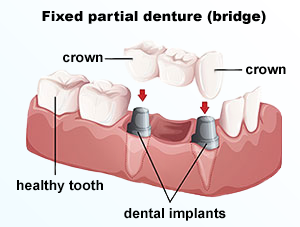Implant Dentistry

The Dental Implant Procedure
The dental implant procedure is usually a three-step process requiring oral surgery that is provided by your dentist, a prosthodontist or an oral surgeon. During the first step of dental treatment, your dentist drills a hole into the jawbone and a titanium implant is screwed into place. This portion of your dental implant treatment might sound painful, but most patients are comfortable with just local anesthesia. (If necessary, sedation dentistry can be used for anxious patients.) At the end of the procedure, the gum is secured over the dental implant, which will remain covered long enough for it to undergo the process of osseointegration, when the implant actually fuses to the bone. Osseointegration usually takes three to six months. As with any dental surgery, you may experience some mild discomfort as the dental implant heals.
The dental implant is uncovered during the second phase of treatment and a post is added. This serves as an extension and together with the dental implant serves as the foundation for your new tooth. Once the gum tissue around the post has had a chance to heal, your dentist places a dental crown on top. Since it is fixed to a post, your new tooth is extremely secure and will function just like any other tooth.
Although the conventional dental implant process usually takes several months to complete and involves multiple appointments, dental implant technology continues to advance. The result is options like single-visit dental implants, Nobel Teeth-In-An-HourTM and mini implants.
Dental Implants: A Lasting Solution
Dental implants can replace a single tooth, several teeth or all of them. Dental implants can also be used to anchor a bridge or dentures into place. If you need to have all of your teeth replaced, implant-supported dentures are ideal, providing more stability than traditional dentures and costing less than a complete set of single dental implants.
Just like any surgery, the dental implant procedure will be more successful if you are healthy. That means practicing excellent oral hygiene, eating well and not smoking. Patients must also maintain a significant amount of jaw bone to support dental implants. Discuss your pre-existing medical conditions with your dentist. He or she can best determine if you are a candidate for dental implants.
Remember, if properly cared for, dental implants can last a lifetime! Although the replaced tooth itself can't get cavities, you still need to brush and floss the area to remove dental plaque buildup. Regular dental visits every six months are also recommended.